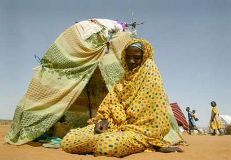Darfur peace talks adjourn for 4 weeks
ABUJA, Nigeria, Sep 18 (PANA) — Sequel to what appeared a deadlock over the disarming of rebel forces and the pro-government Janjaweed militias, the African Union-brokered peace talks here on the crisis in Sudan’s western Darfur region formally adjourned for four weeks Friday evening.
 After the intervention of AU chairman and Nigerian President
After the intervention of AU chairman and Nigerian President
Olusegun Obasanjo failed to resolve the disagreement, the
mediators who proposed the adjournment said the move would allow
time for internal consultations by parties to the talks – the
Khartoum government and the rebels.
“In the meantime and in order to consolidate gains made during
this second round, it is imperative that the parties strictly
abide by the ceasefire and refrain from any action [that can
hinder] a negotiated settlement,” an AU statement said after the
final formal session Friday night.
“In particular, no effort should be spared to prevent attacks,
threats, intimidation or any other form of violence against
civilians,” it said.
According to the AU, “while progress has been made, more efforts
are needed to bridge the gap between the parties on the
outstanding issues and pave the way for a comprehensive political
settlement of the crisis in Darfur.”
It said the resumption date for the talks would be communicated
to the parties.
Despite the problems of the last few days, the Sudanese
government delegation and the two main rebel movements – Justice
and Equality Movement (JEM) and the Sudanese Liberation Movement
(SLM) – which took up arms against it 19 months ago are not
leaving the Nigerian capital city of Abuja empty handed.
The parties managed to agree on the issue of ensuring greater
access for international aid groups to the more than one million
displaced people in the region.
Though the rebels refused to sign the agreement until the issue
of security was fully negotiated, the Sudanese government pledged
Friday to implement the agreement.
Two other items, political as well as economic and social matters
have yet to be discussed.
The talks broke down because the rebels rejected plans to disarm
their forces ahead of a comprehensive peace deal, while at the
same time insisting on an immediate disarmament of the Janjaweed,
blamed for most of the atrocities in the region, where more than
50,000 people have been killed.
On its side, the government insists on a simultaneous disarmament
of the rebel forces and the Janjaweed.
The Sudanese government blamed the rebels and the US for the
collapse of the talks, but promised to implement the protocol on
humanitarian issues.
“We feel that the people have been suffering under very a severe
humanitarian situation,” State minister for Foreign Affairs Najib
Abdulwahab said about Khartoum’s decision to unilaterally
implement the agreement.
He said while discussions on the security issues were
progressing, “statements made by senior officials of the USA
poisoned the talks’ environment and sent wrong signals to the
rebels who immediately stiffened their positions and contracted
sudden disinterest on the talks and discussions and adopted a
negative attitude.”
He also accused the movements of presenting illogical and
unrealistic demands to the government and Sudanese people, adding
that they also failed to agree between them on the various
issues.
“They presented demands which were illogical, unrealistic,
irrelevant and unacceptable, not only to the delegation of the
government of Sudan but also to the mass of the Sudanese people.
“Worst of all, the rebels disregarded the appeal of President
Olusegun Obasanjo and chairman of the AU, to sign the agreed
protocol on humanitarian issues, thus demonstrating a blatant
indifference to the people of Darfur they claim to fight for,”
the minister charged.
“One (SLM) was disposed to signing the protocol while the other
(JEM) was simply adamant,” he said, warning that “the people of
Darfur must not be allowed to be victims of narrow-minded
partisan agenda of the movements.”
Abdulwahab insisted that the solution to the crisis in Darfur
would not come from outside Africa and blamed the movements for
making the issue of Darfur to be manipulated from outside the
continent.
“We affirm our support for the position of President Obasanjo
that the solution to African problems could only be found in
Africa. We have always said that the problem of Darfur is an
African problem, so its solution could only be found in Abuja
(Africa),” he emphasised.
He said the government of Sudan was ready to continue with the
talks anytime the mediators decided.
“The government of Sudan maintains that the talks led by the AU
and assisted by other concerned parties will pave the way for
final, durable and just resolution of the conflict,” the minister
said.
JEM spokesman Ahmed Togodt blamed the government for the
deadlock, insisting “if we want to solve the problem in Darfur,
then it is very important to address the problem of security.”
